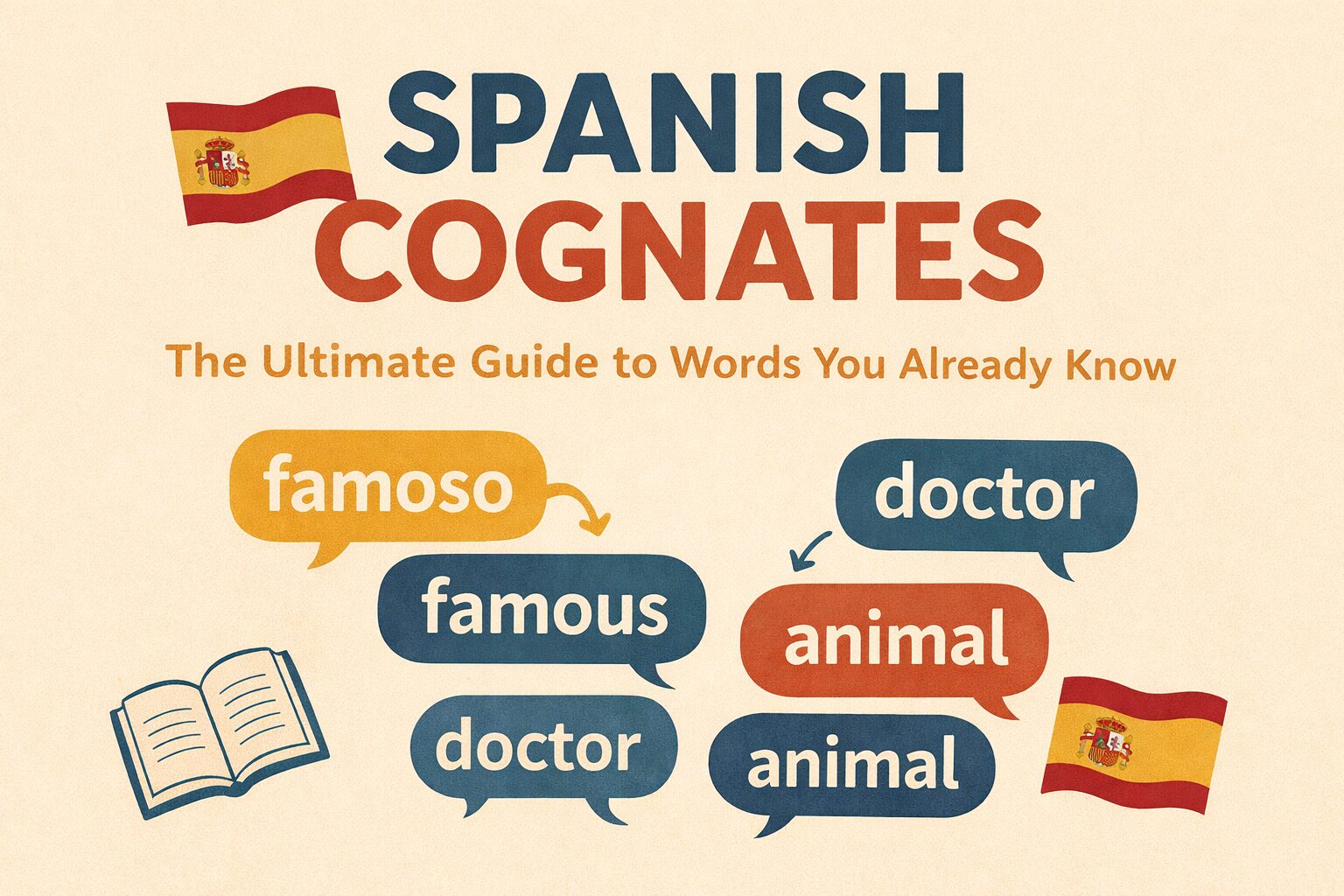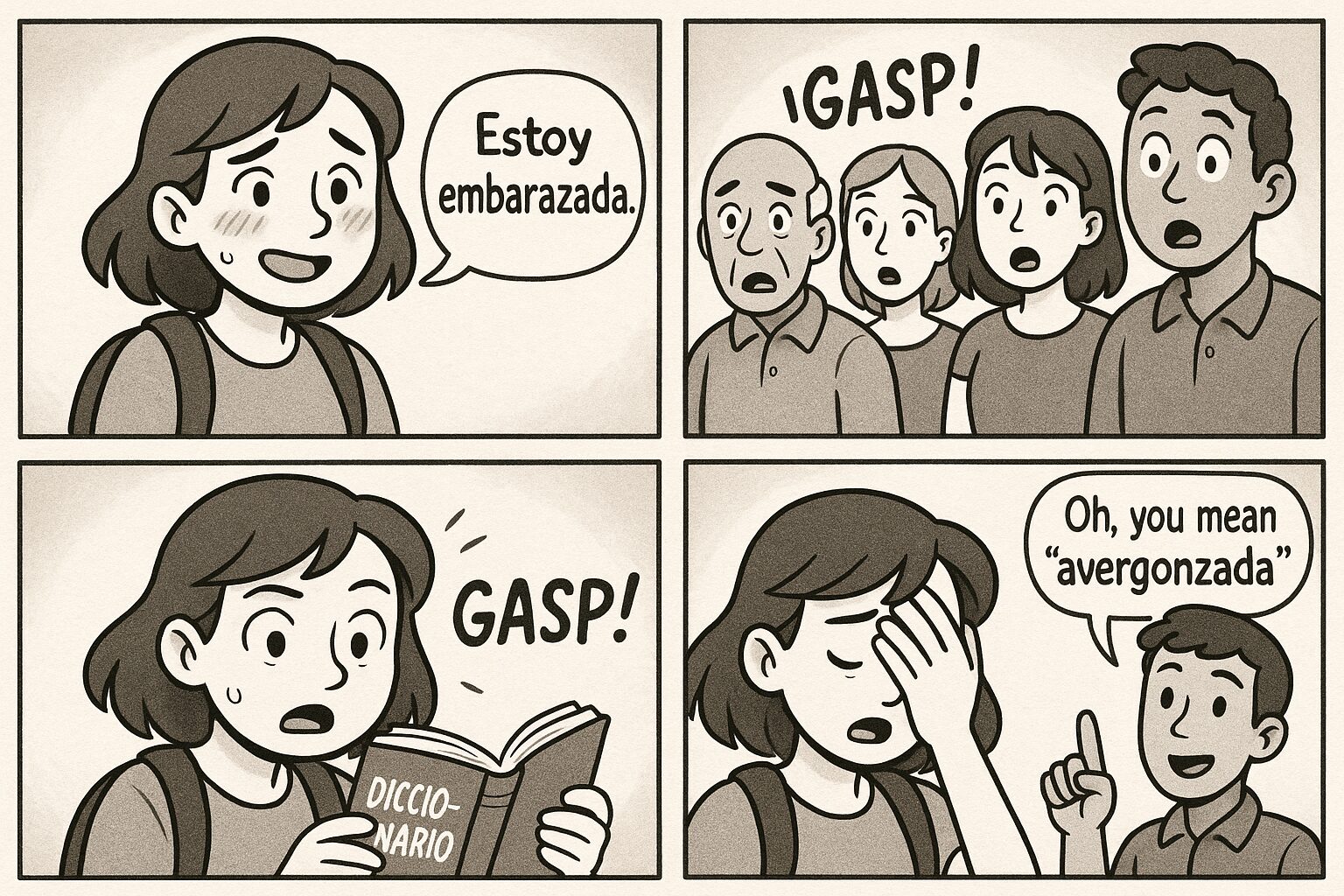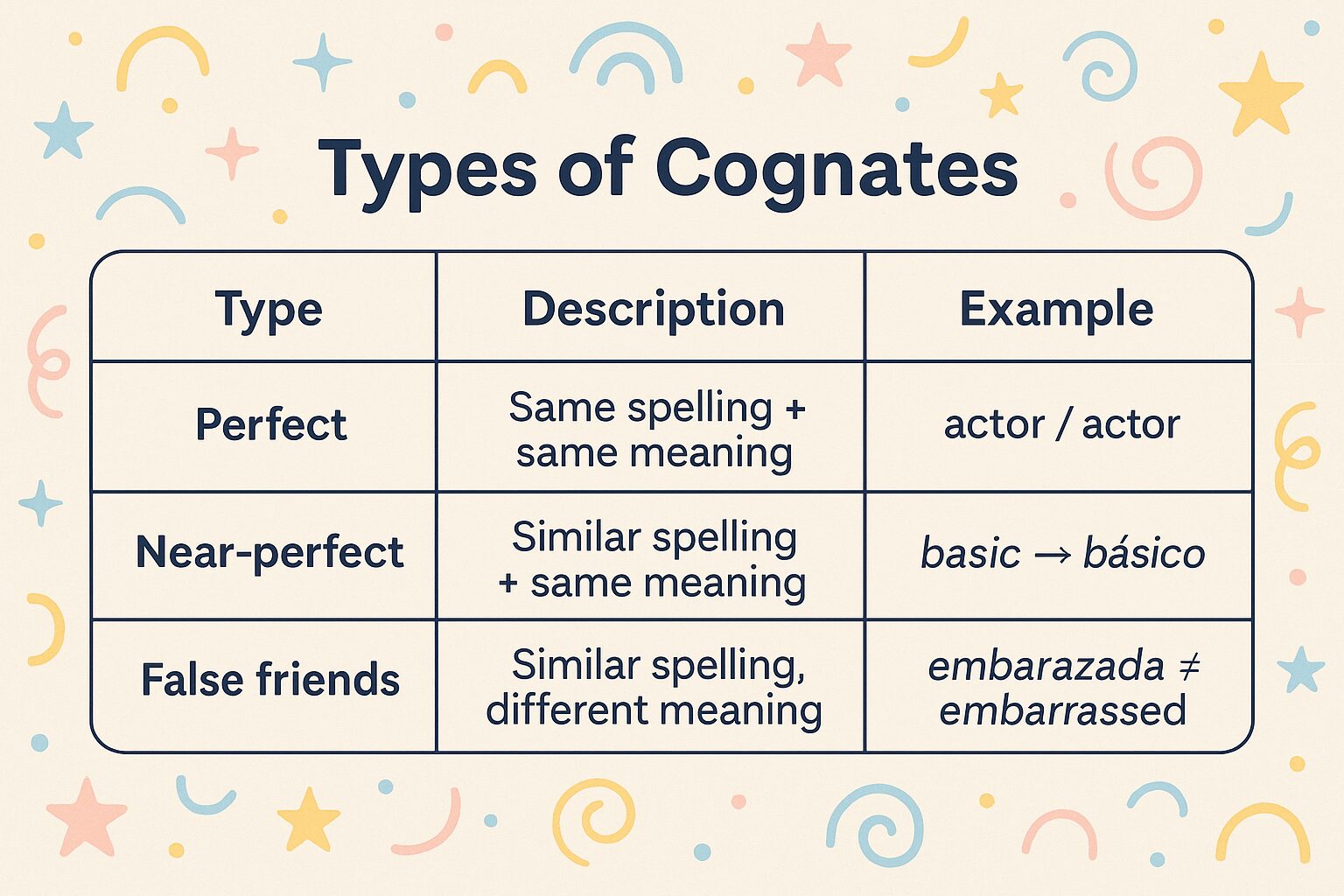Spanish Cognates: The Ultimate Guide to Words You Already Know

Get our free email course, Shortcut to Conversational.
Have conversations faster, understand people when they speak fast, and other tested tips to learn faster.
More infoStarting a new language can feel overwhelming, but Spanish gives you a surprisingly generous gift right from the beginning with Spanish cognates: a whole collection of words you already understand. Even if you’ve never studied Spanish before, you’ll run into terms you can decipher at a glance, giving you that reassuring “Oh, this isn’t as hard as I thought” feeling.
Let’s explore how these built-in “bonus words” work and how you can use them to level up your Spanish fast.
What are cognates?
A cognate is a word in one language that shares the same origin as a word from another language, making it easy to recognize even if you don’t speak the other language.
Since Spanish and English share Latin roots, many words look very similar in both languages. Fortunately for language learners, their meanings are often similar as well (though not always).
In other words, thanks to these cognates in Spanish, there are hundreds of words that you already know even if you’ve never studied Spanish!
Types of Spanish Cognates (With Examples)
Now that we’ve established what we mean by cognates, let’s learn how to recognize them. The key is that cognates tend to look quite similar in both languages, often only differing by the presence of an accent or a word ending that’s more typical in one language or the other.
We can group most Spanish cognates into three helpful categories: perfect cognates, near-perfect cognates, and false cognates.
Perfect cognates are words that are identical in both English and Spanish, both in spelling and meaning. Perfect cognates in Spanish will still be pronounced differently, and may even take an accent on one of their vowels, but should otherwise be easily recognized by English speakers.
Near-perfect cognates are words that look similar in both languages and mean the same thing, just with slight spelling differences. Fortunately for learners, many near-perfect cognates in Spanish follow straightforward rules to convert the words between the English and Spanish cognates.
False cognates, also known as false friends, are words that appear similar in Spanish and English but don’t share the same meaning. False friends are the cognates that are most likely to cause confusion, often leading to awkward situations when used incorrectly.
A common mistake among Spanish students, for example, is to use the Spanish word “embarazada” when they want to say they’re “embarrassed,” when in fact it means “pregnant.” As you can see, the incorrect use of false friends can easily lead to uncomfortable misunderstandings.
In this video, Mafalda introduces the most important 10 cognates in Spanish that fall into this category. We also have a dedicated post that explains them in more detail, including a list of false friends in Spanish that you should be aware of!
For the rest of today’s post we’ll focus on perfect and near-perfect cognates in Spanish, listing the most common vocabulary for each category. Get ready for hundreds of Spanish words that you essentially already know!
Perfect cognates
Spanish perfect cognates are words that are spelled exactly the same in both English and Spanish. Because of this one-to-one match, they’re often called exact cognates. The only difference is that some perfect cognates in Spanish have accent marks, like in the words ópera or conclusión.
It’s also important to remember that, even if the spelling resembles an English word you’re familiar with, it needs to be pronounced in Spanish! (Our alphabet post is a good reference, including audio recordings, on how to pronounce each letter in Spanish.)
By learning the Spanish perfect cognates, you can unlock so many new vocabulary words that you already know in English! Below, you’ll find a list of nearly 200 Spanish-English perfect cognates. Because they share identical spelling and meaning, we don’t need to include translations. Just keep in mind that many words can carry multiple definitions in both languages; here, we focus only on the meanings they share as cognates.
| Actor | Final | Panorama |
| Admirable | Flexible | Particular |
| Agenda | Formal | Pasta |
| Alcohol | Fórmula | Pastor |
| Altar | Frontal | Patio |
| Animal | Fundamental | Patrimonial |
| Área | Gala | Peculiar |
| Artificial | Gas | Penal |
| Auto | General | Perfume |
| Balance | Génesis | Personal |
| Bar | Global | Piano |
| Base | Idea | Plaza |
| Brutal | Ideal | Plural |
| Cable | Imperial | Popular |
| Canal | Implacable | Pretensión |
| Cáncer | Incursión | Principal |
| Canon | Individual | Probable |
| Capital | Industrial | Propaganda |
| Carbón | Inevitable | Protector |
| Cartón | Inferior | Provincial |
| Central | Informal | Radical |
| Cerebral | Inseparable | Radio |
| Chocolate | Inspector | Región |
| Circular | Interminable | Regional |
| Civil | Invasión | Regular |
| Club | Invisible | Religión |
| Collar | Irregular | Reunión |
| Colonial | Judicial | Revisión |
| Coma | Kilo | Ritual |
| Combustión | Lateral | Rural |
| Conclusión | Legal | Secular |
| Conductor | Liberal | Sentimental |
| Confusión | Literal | Serial |
| Considerable | Local | Sexual |
| Control | Macho | Similar |
| Cordial | Maestro | Simple |
| Criminal | Mango | Singular |
| Crisis | Manía | Social |
| Cultural | Manual | Solar |
| Debate | Marginal | Solo |
| Decisión | Material | Subversión |
| Diagonal | Matrimonial | Superficial |
| Dimensión | Medieval | Superior |
| Director | Mediocre | Taxi |
| Disco | Melón | Televisión |
| División | Mental | Terrible |
| Doctor | Menú | Terror |
| Drama | Metal | Total |
| Editorial | Miserable | Transcendental |
| Electoral | Moral | Triple |
| Elemental | Mortal | Tropical |
| Enigma | Motel | Unión |
| Error | Motor | Universal |
| Excursión | Múltiple | Usual |
| Experimental | Municipal | Verbal |
| Explosión | Musical | Versión |
| Expulsión | Natural | Vertical |
| Extensión | Noble | Violín |
| Exterior | Normal | Visible |
| Factor | Nostalgia | Visual |
| Familiar | Ópera | Vital |
| Fatal | Oral | Vulgar |
| Federal | Oriental | Vulnerable |
| Festival | Original | Vulva |
Near-perfect cognates
Near-perfect cognates carry the same meaning in both Spanish and English, and look similar enough to be recognizable, even with small spelling differences. Their common origins are still clear, even as each language has adapted the spelling over time.
In many cases, we can apply simple rules to convert such near-perfect cognates between Spanish and English. We’ll break our next lists of near-perfect cognates examples down into the following rules:
- ‑ic to ‑ico (like basic to básico)
- ‑ous to ‑oso (like curious to curioso)
- ‑ct to ‑cto (like abstract to abstracto)
- ‑tion to ‑ción (like information to información)
- ‑ary to ‑ario (like anniversary to aniversario)
- assorted near-perfect cognates (like abyss to abismo)
‑ic to ‑ico
Here we have a set of Spanish adjectives that are almost perfect cognates, except for the standard Spanish adjective endings of ‑o or ‑a. When you have an English adjective that ends in -ic, all you need to do is add the right ending to get its Spanish translation. Here are the four versions for the translation of the English adjective basic, for example:
| Basic in Spanish | masculine | feminine |
| singular | básico | básica |
| plural | básicos | básicas |
This formula of converting ‑ic endings to ‑ico also applies to some nouns, such as medic to médico, or panic to pánico, for example.
| English | Spanish |
| Academic | Académico |
| Alcoholic | Alcohólico |
| Artistic | Artístico |
| Authentic | Auténtico |
| Automatic | Automático |
| Basic | Básico |
| Characteristic | Característico |
| Classic | Clásico |
| Comic | Cómico |
| Democratic | Democrático |
| Dynamic | Dinámico |
| Diplomatic | Diplomático |
| Domestic | Doméstico |
| Dramatic | Dramático |
| Economic | Económico |
| Electronic | Electrónico |
| Erotic | Erótico |
| Exotic | Exótico |
| Fantastic | Fantástico |
| Generic | Genérico |
| Genetic | Genético |
| Geometric | Geométrico |
| Heroic | Heroico |
| Ironic | Irónico |
| Magic | Mágico |
| Medic | Médico |
| Mosaic | Mosaico |
| Organic | Orgánico |
| Panic | Pánico |
| Plastic | Plástico |
| Poetic | Poético |
| Public | Público |
| Romantic | Romántico |
| Systematic | Sistemático |
| Tragic | Trágico |
‑ous to ‑oso
Just like we saw with the previous set of English and Spanish cognates, this next rule applies to a lot of common adjectives. The resulting Spanish adjectives appear quite similar to their English counterparts, and even sound similar when pronounced.
Remember that although we’re listing them here in the singular masculine forms ending in ‑oso, these Spanish adjectives may also end in ‑osa, ‑osos, or ‑osas.
| English adjective | Spanish adjective |
| Curious | Curioso |
| Delicious | Delicioso |
| Glorious | Glorioso |
| Mysterious | Misterioso |
| Numerous | Numeroso |
| Precious | Precioso |
| Religious | Religioso |
| Tedious | Tedioso |
‑ct to ‑cto
Just like the almost-perfect cognates we saw above where the rule was to replace ‑ic with ‑ico, here we have English words that end in ‑ct, along with their Spanish equivalents that simply end in ‑cto. This rule applies to many Spanish nouns as well as to Spanish adjectives, so the only difference between the two languages is the added ‑o at the end. Let’s start with the nouns:
| English noun | Spanish noun |
| Act | Acto |
| Artefact | Artefacto |
| Conflict | Conflicto |
| Contact | Contacto |
| Insect | Insecto |
| Product | Producto |
Now let’s see some of the words that follow this rule of ‑ct to ‑cto. Following Spanish adjective rules, remember to adopt the ending to match the gender and number of the nouns they describe.
| English adjective | Spanish adjective |
| Abstract | Abstracto |
| Compact | Compacto |
| Correct | Correcto |
| Exact | Exacto |
| Perfect | Perfecto |
‑tion to ‑ción
This set of near-perfect cognates applies to a wide variety of intangible nouns. In English, nouns end in ‑tion, while in Spanish the equivalent suffix is ‑ción. In many cases, we have only one consonant earlier in the Spanish word, in contrast to the double consonants in the English versions, as in aplicación vs application.
Regarding pronunciation, the final ‑ción syllable begins with an /s/ sound in Spanish, whereas the ‑tion in English is pronounced beginning with a /sh/ sound. Also, remember to place the emphasis on the final accented syllable in the Spanish words, as opposed to emphasizing the second-to-last syllable like you’re used to in their English versions.
| English noun | Spanish noun |
| Abstraction | Abstracción |
| Action | Acción |
| Accusation | Acusación |
| Adaptation | Adaptación |
| Admiration | Admiración |
| Application | Aplicación |
| Appreciation | Apreciación |
| Association | Asociación |
| Aspiration | Aspiración |
| Attention | Atención |
| Attraction | Atracción |
| Authorization | Autorización |
| Celebration | Celebración |
| Circulation | Circulación |
| Civilization | Civilización |
| Classification | Clasificación |
| Collaboration | Colaboración |
| Collection | Colección |
| Combination | Combinación |
| Compensation | Compensación |
| Composition | Composición |
| Concentration | Concentración |
| Conception | Concepción |
| Condition | Condición |
| Conservation | Conservación |
| Consideration | Consideración |
| Constitution | Constitución |
| Construction | Construcción |
| Exposition | Exposición |
| Fiction | Ficción |
| Formation | Formación |
| Nation | Nación |
| Simplification | Simplificación |
‑ary to ‑ario
Here we have another common rule for converting Spanish and English near-perfect cognates: where English word ends in ‑ary, the same Spanish word ends in ‑ario. This is common among nouns, while it also applies to a number of adjectives.
To illustrate this pattern in context, the list below presents several nouns that showcase how this rule operates between English and Spanish.
| English noun | Spanish noun |
| Adversary | Adversario |
| Anniversary | Aniversario |
| Commentary | Comentario |
| Diary | Diario |
| Glossary | Glosario |
| Estuary | Estuario |
| Rosary | Rosario |
| Salary | Salario |
| Secretary | Secretario |
| Vocabulary | Vocabulario |
Now let’s see some examples of near-perfect cognates that follow this same ‑ary to ‑ario rule, but with adjectives. Note that we’re showing the base form of the Spanish adjectives here, which corresponds to singular masculine nouns. These ‑o endings need to change form according to standard Spanish adjective rules, so the English ‑ary ending may also be converted to ‑aria, ‑arios, and ‑arias when the adjective describes feminine or plural nouns.
| English adjective | Spanish adjective |
| Arbitrary | Arbitrario |
| Complementary | Complementario |
| Contrary | Contrario |
| Primary | Primario |
| Solitary | Solitario |
| Temporary | Temporario |
Assorted near-perfect cognates: The best of the rest
So far, our lists of near-perfect cognates in Spanish have all focused on specific rules that can be applied regularly across a number of words with similar forms. In addition to those rules, however, there are also plenty of near-perfect cognates in English and Spanish whose differences between the two languages can’t be summed up as easily. We’ll think of these as the best of the rest Spanish cognates!
Take a look at the list we provide here, comparing the two languages. They’re all still pretty similar to each other, right? Many of them exhibit changes that are similar to the rules we saw above, but different enough that we didn’t include them on those lists. Others just seem to follow their own rules, but are still clearly cognates, since the words’ common ancestors remain evident in both languages.
These English-Spanish cognates examples fall into several grammatical categories, so we’ll just list them all together.
| English cognate | Spanish cognate |
| Abundant | Abundante |
| Abyss | Abismo |
| Accent | Acento |
| Acid | Ácido |
| Air | Aire |
| Annual | Anual |
| Archaic | Arcaico |
| Art | Arte |
| Chimera | Quimera |
| Decade | Década |
| Demon | Demonio |
| Disaster | Desastre |
| Except | Excepto |
| Kiosk | Kiosco |
| Magnificent | Magnífico |
| Rancid | Rancio |
| Rare | Raro |
| Remote | Remoto |
| Rent | Renta |
| Rich | Rico |
| Satire | Sátira |
| Senate | Senado |
| Series | Serie |
| Soldier | Soldado |
| Solid | Sólido |
| Subtle | Sutil |
| Suffer | Sufrir |
| Used | Usado |
| Vehicle | Vehículo |
Conclusion: Spanish cognates
Learning Spanish doesn’t always require starting from zero, and cognates are proof of this. With hundreds of familiar words already at your disposal, you’ve gained a powerful shortcut into the language. Now that you understand how perfect and near-perfect cognates work, and how spelling patterns connect the two languages, you can spot new vocabulary more easily wherever you encounter it.
As you continue learning Spanish, keep an eye out for these patterns. The more you notice them in context, the faster your vocabulary will grow. And remember: every new cognate you recognize is one less word you need to “study.”
Let cognates be your springboard into deeper learning. Spanish is already more familiar than you think. Now it’s time to build on that foundation!
With over 300 perfect and near-perfect cognates provided throughout this post, you may get the impression that any words that appear the same between English and Spanish have the same meanings. Don’t forget that, unfortunately, this isn’t always the case! Check out our companion post for an exploration of false cognates in Spanish, where we provide a list of over 160 words in Spanish and English that look similar, but whose meanings differ.
To end on a positive note and allow you to test how well you can understand Spanish sentences that are composed of cognates, we’ll leave you with a series of sentences that use many of the vocabulary words we introduced in today’s post. If you can tell what they mean without looking at their translations below, you’re experiencing the beauty of recognizing Spanish cognates!
Cognates in Spanish: Examples
Read through these sentences and see how well you understand their meanings thanks to their use of Spanish cognates.
- La aspiración de la nación democrática es una economía sólida.
- La civilización democrática sufrió un desastre económico anual.
- El salario básico fue un tema central en el debate económico del senado.
- El comentario irónico sobre la renta pública causó un conflicto político.
- El soldado solitario admiró la formación compacta de vehículos.
- El demonio glorioso vive en un abismo remoto y misterioso.
- La celebración anual incluye una colección gloriosa de arte clásico.
- La colección artística incluía un rosario magnífico y un mosaico antiguo.
- La celebración poética fue una combinación fantástica de arte y sátira.
- La combinación exacta de colores muestra un efecto artístico dramático.
Cognates in English
How did you do? Here are the translations so you can recognize all of the English and Spanish cognates in these examples.
- The aspiration of the democratic nation is a solid economy.
- The democratic civilization suffered an annual economic disaster.
- The basic salary was a central theme in the senate’s economic debate.
- The ironic comment about public rent caused a political conflict.
- The solitary soldier admired the compact formation of vehicles.
- The glorious demon lives in a remote and mysterious abyss.
- The annual celebration includes a glorious collection of classical art.
- The artistic collection included a magnificent rosary and an ancient mosaic.
- The poetic celebration was a fantastic combination of art and satire.
- The exact combination of colors shows a dramatic artistic effect.





